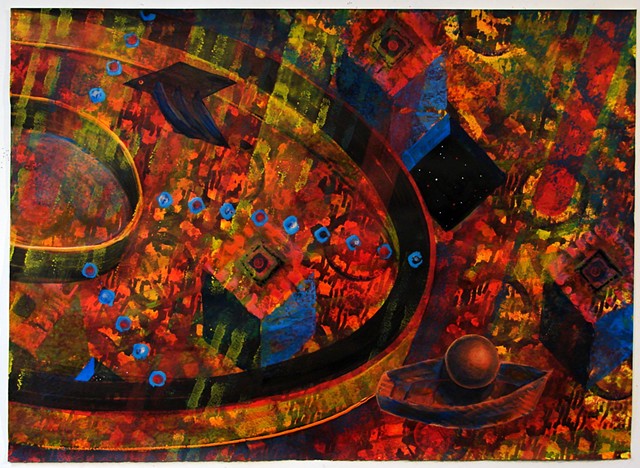Wanders Beyond the Realm of Collapsing Thought
“… Man has a feeling that the apparent facts of existence are not final; that his supreme welfare depends on his being able to remain in perfect relationship with some great mystery behind the veil, at the threshold of a larger life, which is forever giving him a far higher value than a mere continuation of his physical life in the material world.” - Rabindranath Tagore from The Religion of Man
There is a practice among a sect of Hinduism in India that utilizes Yoga to find an emptied state of mind that may be similar to some forms of Zen meditation, or perhaps a kind of extended state of satori, an on-going bliss that recognizes the self as completely absorbed by its surroundings and becoming one with essentially everything. Everything? Everything that we can think of seems like the most complete answer, but if we can think it then it remains both part of us and part of what contains us. Simultaneously or not, there is still a separation that has originated in thought and remains a quality of our thinking and perception of it.
John Cage once engaged in an experiment that attempted to create a chamber of complete silence. After achieving a sound-proof cell, Cage discovered that he could hear the blood circulating through his body – heartbeat and plumbing echoing within himself. There would always be ‘sound’ and we would always be able to perceive it.
Where is the edge of thought? Is there a barrier to life as we know it guarding this perimeter where thought collapses completely, and consciousness becomes something we have yet to be able to define – an absence of thinking in contact with our surroundings. We are at a loss to sustain a verbal description of that which our senses have never experienced, and thus unable to create terminology to describe it. Still in our mind’s eye we can imagine the barrier if not what it would feel like to exist beyond it. This is, no doubt, due to the limits of our own existential self-image.
In the excerpt from Tagore above, he suggests that we might develop a “relationship with some great mystery behind the veil.” For Tagore, Man is his own divine project with the recognition that consciousness also enables an imagination for creating a life that reflects the infinite and active participation in it now and after our bodies no longer exist. By focusing less on material gain and satisfying what he refers to as the more animal side of our nature, and instead attempting as individuals to embrace the gift of imagination and its aspirations towards a transcendent point of departure through the likes of music, art, poetry, Man can engage a “far higher value.” This active path towards comprehension, instead of looking at the thought of total physical and material collapse as an ending, allows instead an acceptance and appreciation for being a continuing part of what Lao tzu referred to as the wellspring.
As eons turn the cosmos about us and we come to a physical ending in life, can we continue at some other level of being to wander beyond the realm of collapsed thought into another aspect of continuous creation? Do the elemental aspects of Hydrogen and our Imagination dance beyond our selves, beyond our threshold of thinking about life?
